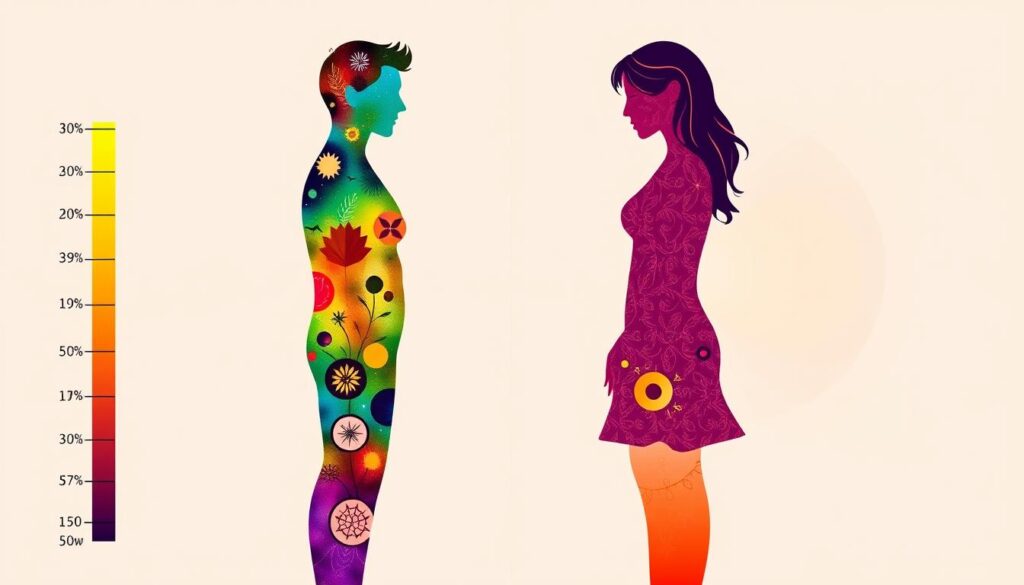It’s important to know the Average Libido Level Male or Female. Libido is our sexual drive or desire. It affects our intimate relationships and overall well-being. We’ll look into what libido means for our sexual health, using info from the American Psychological Association and health studies.
What is Libido?
Libido is about both our mind and body’s sexual desire. It changes a lot from person to person. The definition of libido includes many things like biology, psychology, and society. These factors shape how we feel about sex and attraction.
Defining Libido
Libido is linked to our sexual drive. It’s key in our relationships and mental health. Things like age, stress, and our health can change how much we want sex.
Understanding libido is complex. It’s important to talk about it to improve our sexual health.
The Role of Libido in Sexual Health
Libido affects our libido and sexual health in big ways. It impacts our feelings and physical closeness. A good libido helps our relationships, but low libido can cause problems.

Factors Influencing Libido Levels
Understanding the factors influencing libido helps us see why sexual desire changes. These factors fall into three main areas: physical, mental and emotional, and hormonal impacts.
Physical Factors
Many physical factors can affect libido. These include:
- Health conditions like diabetes or heart disease
- Medications, especially antidepressants and blood pressure treatments
- Lifestyle habits, including diet and exercise
Improving these physical factors can boost sexual health and desire.
Mental and Emotional Influences
Mental influences on libido are key. Factors like:
- Work or personal life stress
- Anxiety about performance or intimacy
- Unresolved relationship dynamics
These aspects cause libido to change. They show how mental well-being affects sexual drive.
Hormonal Impacts
Hormones also play a big role in libido. Testosterone and estrogen levels change over time. These changes affect sexual desire in different ways for men and women. Hormonal shifts due to aging or health issues can greatly impact libido. Knowing how hormones work helps us understand their role in libido.

Average Libido Level Male or Female
Looking into the average libido levels of men and women shows interesting differences. It’s key to understand these to tackle the complex world of sexual desire. Physical health, emotional state, and social influences all affect libido. So, while there are gender differences, individual experiences can vary a lot.
Comparative Analysis of Libido in Both Genders
Research shows clear differences in libido between men and women. Men usually have a higher libido, thanks to testosterone. Women’s libido varies more, influenced by emotions and hormones. This average libido levels gender comparison shows desire is a range, not a single point.
Statistics and Studies on Average Levels
The Kinsey Institute’s data shows men often have a steady desire for sex. Women, however, see their libido change with life stages and personal events. For example, many women’s libido changes with their menstrual cycle. These studies on libido levels also show how society can affect what we think is “normal” when it comes to libido.

Understanding Gender Differences in Libido
Looking into gender differences in libido shows us a complex world. Many think men have a stronger sex drive because of testosterone. But, this view is too simple. Society and personal experiences also shape our sexual desires.
Common Misconceptions
Many believe men always want sex more than women. This idea comes from old gender roles. But, research shows that both men and women’s sex drives change. This change is influenced by feelings and relationships.
By understanding this, we can see that sex is more balanced between genders.
Biological Factors and Their Impacts
Biological factors do affect our sex drive, but they’re not everything. Hormones, brain chemistry, and health also matter. Studies show that men and women can have similar sex drives.
This challenges old ideas about gender differences in libido. It shows that sex desire is unique to each person. For more on this, check out sexual desire studies here.
Age and Libido: What to Expect
The link between age and libido is complex. Many factors influence sexual desire at different times in life. It’s important to know that a drop in desire isn’t a must for everyone. Let’s look into how sexual interest can evolve with age.
How Age Affects Sexual Desire
As we get older, our hormones and health can change, affecting our libido. For example, in teens, high testosterone leads to a surge in libido. In adulthood, hormone levels may shift, but many still have a strong sexual interest. By middle age, some might see a slow decline, but it’s not the same for everyone.
Changing Libido Levels Throughout Life Stages
It’s key to understand how libido changes at different stages of life. Lifestyle, emotional health, and how society views sex are all important. Young adults often feel a strong urge for sex, while middle age brings more responsibilities that can impact interest. Yet, many older adults remain sexually active, debunking the myth that aging means less sex.
The Impact of Lifestyle on Libido
It’s important to know how lifestyle affects libido for better sexual health. Diet and exercise are key. Making smart choices in these areas can boost libido.
The Role of Diet and Nutrition
Diet greatly impacts sexual desire. Some foods can increase libido, while others can decrease it. For example, fruits and vegetables boost blood flow.
Omega-3 fatty acids in fish like salmon are good for the heart. This is important for sex. But, too much sugar and processed foods can lower libido by causing energy drops.
- Fruits and vegetables for antioxidants
- Dark chocolate for increased serotonin
- Nuts and seeds for healthy fats
- Spices like ginger and chili for boosted circulation
Exercise and Its Effects on Sexual Desire
Exercise is crucial for libido. It improves health and boosts sex drive. Studies show that exercise raises testosterone, which is key for sex in both men and women.
Simple activities like walking, swimming, or yoga can make you feel better. This can lead to a stronger libido.
Combining a healthy diet with exercise can greatly improve libido. Knowing how lifestyle affects libido helps make choices for better sex.
Stress and Libido: A Complex Relationship
Stress has a big impact on libido. High stress levels can make you feel less interested in sex. It also makes it hard to feel close to others, affecting your overall happiness.
Knowing how stress affects libido is key. It helps you understand and work on your relationship with desire.
Understanding How Stress Impacts Sexual Desire
Stress can change your hormone levels and make you feel anxious. This can lower your sexual interest. The body releases cortisol when stressed, which can mess with your hormones and libido.
Being aware of how stress affects you can help. It’s about understanding the physical and emotional signs of stress.
Coping Mechanisms to Improve Libido
To fight stress and its effects on libido, try these strategies:
- Mindfulness Meditation: It helps you stay in the moment and feel better emotionally.
- Regular Exercise: It boosts your mood and can help your libido.
- Deep Breathing Techniques: They help calm you down and clear your mind.
- Healthy Communication: Talking openly with your partner can make you feel closer and less stressed.
Using these methods can help reduce stress and improve libido. Taking care of yourself and being mindful can strengthen your connection to desire and intimacy.
Medical Conditions Affecting Libido
Medical conditions can greatly reduce sexual desire in many people. It’s important to understand how chronic illnesses and their treatments affect sexual health. Many factors can play a role, including health conditions and treatment side effects.
Chronic Illnesses and Sexual Desire
Chronic illnesses can deeply affect libido. Conditions like diabetes, heart disease, and hormonal disorders often lower sexual desire. These illnesses can disrupt natural responses and hormonal balances, making it hard to keep a healthy sex drive.
Fatigue and pain from these health issues make intimacy harder. This can lead to a decline in sexual relationships.
Medications That May Decrease Libido
Medications for chronic conditions can also impact libido. Some drugs known to lower sexual desire include:
- Antidepressants: SSRIs are known to decrease libido.
- Blood pressure medications: Some antihypertensives may lower sexual desire.
- Hormonal therapies: Certain treatments can disrupt natural hormone production, affecting libido.
If you’re experiencing reduced sexual desire due to medical conditions or medications, talk to a healthcare professional. They can help find a way to manage these challenges.
Enhancing Libido Through Natural Remedies
Many people look for natural ways to boost their libido. Herbal supplements are often used for this purpose. They are believed to increase sexual desire. Making lifestyle changes can also help improve sexual health.
Herbal Supplements for Increased Desire
Several herbal supplements are known to boost libido. Here are some of the most popular ones:
- Maca Root – This Peruvian herb, often consumed in powder form, is believed to enhance stamina and sexual desire.
- Ginseng – Known for its energy-boosting properties, ginseng may also contribute to an improved libido.
- Ashwagandha – Widely used in Ayurveda, this herb is known for reducing stress, which can indirectly enhance sexual desire.
Lifestyle Changes to Boost Libido
Along with herbal supplements, making lifestyle changes can also boost libido. These changes can help create a better environment for increasing libido:
- Prioritize Sleep – Quality rest helps balance hormones and reduces fatigue, which can positively affect sexual desire.
- Manage Stress – Chronic stress can diminish libido. Engage in relaxation techniques such as yoga or meditation.
- Maintain a Healthy Weight – Achieving a balanced weight through proper diet and exercise often improves self-esteem and sexual function.
When to Seek Help for Low Libido
Noticing a drop in your libido can signal a problem. There are low libido signs that tell you it’s time to see a doctor. Knowing these signs is key to keeping your sex life healthy.
Signs Your Libido May Be Abnormally Low
- Consistent lack of interest in sexual activities.
- Feeling emotionally disconnected from your partner.
- Experiencing stress or anxiety related to sexual performance.
- Noticing a decrease in sexual fantasies or desires.
- Changes in mood that affect intimacy.
Consulting a Healthcare Professional
Talking to a healthcare professional libido consultation can shed light on your issues. Be honest about your feelings and what’s going on. This can lead to solutions that fit your life. A doctor can also check for health problems that might be causing your low libido.
Communication and Libido in Relationships
Talking openly about libido is key in relationships. It helps partners understand each other’s desires. This way, they can meet each other’s needs and feel closer. It’s important to be open and honest in these talks.
Discussing Sexual Desire with Your Partner
Talking about sexual desire can be hard. Here are some tips to make it easier:
- Choose the right moment: Find a relaxed setting free of distractions.
- Use “I” statements: Express personal feelings to avoid placing blame.
- Encourage openness: Create a safe space for your partner to share their thoughts.
- Be receptive: Actively listen to your partner’s perspective without judgment.
These steps help create a supportive space. This is important for understanding each other’s needs and boosting intimacy.
The Role of Intimacy in Enhancing Libido
Intimacy is more than just physical touch. It’s also about emotional connection. Studies show that emotional closeness leads to happier relationships. Building strong emotional bonds can really help with libido.
- Engage in shared activities: Spend quality time together to deepen your connection.
- Practice affection: Simple gestures of physical touch can strengthen emotional bonds.
- Support each other: Provide encouragement and understanding during tough times.
- Prioritize communication: Regularly discuss feelings and experiences to stay aligned.
By focusing on emotional intimacy, partners can better handle libido changes. This leads to a healthier and more fulfilling sexual life.
Myths Surrounding Libido Levels
Libido is complex and often misunderstood. Many people believe myths that can make them feel confused or inadequate. By clearing up these myths, we can better understand what makes each person unique and enjoyable.
Debunking Common Misconceptions
Many think libido stays the same forever. But it changes with age, health, and lifestyle. Another myth is that libido is only about biology, ignoring emotions and environment. The truth is, libido is different for everyone, based on their life and experiences.
Understanding Cultural Perspectives on Libido
Culture plays a big role in how we see libido. In some places, talking about libido is frowned upon. But in cultures that encourage open talks, people have better attitudes toward it. Knowing this can help us understand and appreciate sexual health more.
The Future of Libido Research
Research into libido is growing, revealing new insights. Technology is key in this progress. Scientists use new methods to study sexual desire, aiming to understand what affects it.
Current Studies and Discoveries
Recent studies have shown how libido is influenced by many factors. These include psychology, biology, and social aspects. New techniques help measure sexual desire more precisely.
For example, research looks at how mindfulness and relationships affect libido. This gives a deeper look into what drives sexual desire.
The Importance of Ongoing Research
This ongoing research is crucial for improving our well-being and views on sex. As our understanding of sexual health grows, so will new treatments and education. It will help those struggling with libido issues, leading to better relationships and lives.
Final Thoughts on Libido Levels
This article has given us a deep look into libido, covering many factors that affect it in men and women. We’ve seen how biology and emotions play big roles in our sexual desire. It shows that libido is more than just physical; it’s deeply connected to our emotional health.
It’s key for people and couples to talk openly about their sexual health. Talking helps us understand each other better and build stronger relationships. As we look to the future, research and changing views on sex will keep us learning more.
Understanding and talking about libido is important at all ages. It helps us get closer to our partners and understand each other better. For more on this, check out the study on sexual desire variability. This research will help us better understand and accept libido in all its forms.






